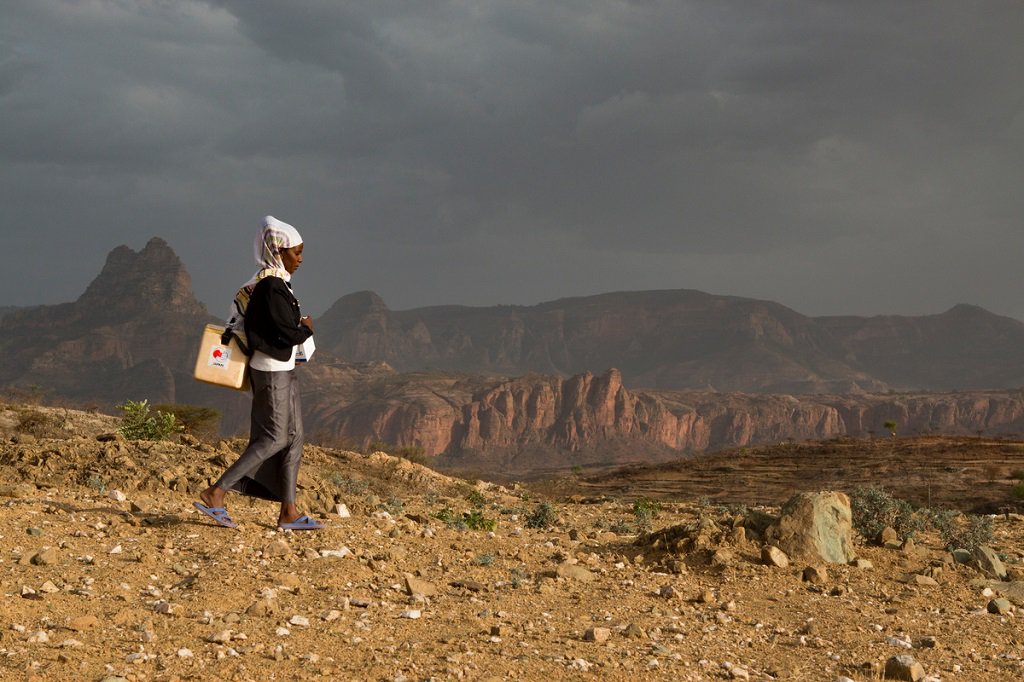This blog originally appeared on The Huffington Post.
A community peer educator visits a brothel in Quito, Ecuador. As a former sex worker herself, she knows this environment as well as anyone in the brothel, and she is here to hand out condoms and offer counselling on HIV to her peers. Today, she works for an organization supported by the Global Fund to defend and promote the human rights of sex workers.
A woman in Ethiopia receives training to provide basic health services and information in her community, where there is no clinic. She is one of nearly 40,000 – an army of women saving lives across the countryside. She and her fellow health extension workers walk long distances to bring access to health care to the homes of underserved rural communities out of reach of bricks and mortar health clinics. Through the National Health Extension Program, these workers are changing the shape of health care delivery in Ethiopia.
Around the world, committees that design and oversee implementation of Global Fund grants include people who are living with or affected by the diseases.
For the Global Fund partnership, this is what it means to put communities at the heart of the fight to end HIV, TB and malaria as epidemics. The Global Fund is investing vigorously in community systems and responses to diseases by supporting organizations and health personnel to provide out-of-clinic prevention, care and treatment.
Such services are essential because, despite the remarkable progress made against AIDS, tuberculosis and malaria in the last two decades, the headline numbers often mask inequalities. Many communities around the world continue to be left behind. Community action is fundamental to expanding access to health services beyond mainstream facilities, where some groups of people still face stigma and discrimination.
Our programs seek to achieve impact by challenging norms that make people more vulnerable to diseases. They also support mechanisms for communities to hold governments and health care providers accountable for providing high-quality services and respecting human rights.
The Global Fund partnership recognizes that greater and equitable impact against the diseases begins with identifying communities disproportionately affected by HIV, tuberculosis and malaria, and understanding their vulnerability and their needs. This can only come from dialogue with people most affected by the diseases. They know the factors that make them vulnerable. They know how geography, education, past experience, socio-economic status, and identity influence their health-seeking behaviors.
We know that community systems remain under prioritized and under resourced. We must do more. The Global Fund supports varied programs around the world that focus on community health infrastructure. The project in Ethiopia has been transformative in giving community members an opportunity to be true agents of their own health. Networks of people disproportionately affected by HIV have received support from the Global Fund to engage with service providers and grant implementers to improve the responsiveness of programs aiming to reach these groups.
The Global Fund is committed to strengthening mechanisms that monitor programs at the community level. In Sierra Leone, we are supporting community-led monitoring and accountability, which is delivering feedback on the performance of services. The aim of this project is to help catalyze problem solving at the local level.
To have lasting impact, we must involve communities in the investments we make every step of the way. The Global Fund’s governance model recognizes the central role of communities in its work by dedicating a seat for people affected by diseases on the Global Fund Board; this seat has the same vote and voice as the largest financial contributor.
In investing in resilient and sustainable systems for health – improved facilities, health care, training for health workers, information management, access, and community support, and response mechanisms – the Global Fund seeks to focus on people and health rather than systems. Strengthening community responses and systems underlines the importance of a people-centered approach. It shows us what we must do to accelerate our role in that approach.
We are improving our systems – making them more efficient and less bureaucratic – to open new opportunities to support community-based organizations. That includes allowing implementers of Global Fund grants to fund small, unregistered organizations or collectives that represent marginalized or even criminalized groups. We cannot end diseases if we insist on only working with registered groups with high financial management capacity, or if we demand endless activity reporting. The Global Fund does not shy away from taking such informed risks. Instead, we approach these issues with openness, seeking innovative controls such as community-based monitoring and social accountability.
In the end, all of these initiatives will succeed or fail depending on how well communities are able to assume ownership of the investments we make together. It is why the Global Fund partnership is built on the principle of local leadership in finding new ways to remove barriers to health services. Such community-led approaches to building robust, responsive systems for health are the surest ways to defeating HIV, tuberculosis and malaria for good.

